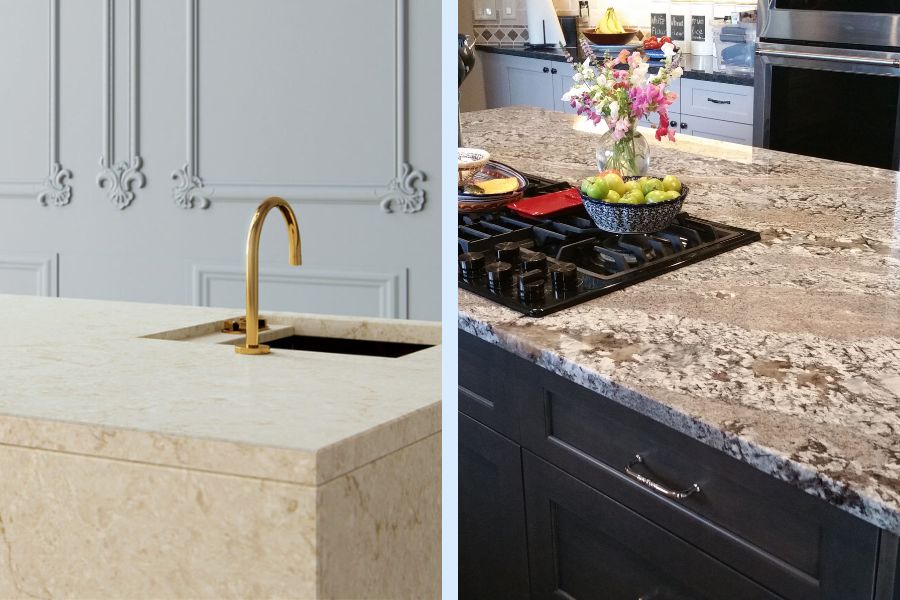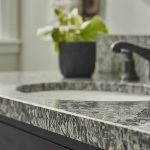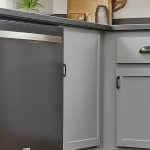Quartz countertops require low maintenance, are resistant to stains, and provide easy cleaning and long-lasting beauty. The vast array of color options ensures seamless complementation with diverse kitchen designs, and the uniform appearance appeals to those seeking a sleek and modern aesthetic.
On the other hand, granite countertops, crafted from natural stone, boast timeless beauty with unique patterns. Granite’s luxurious appeal contributes to increased home value, making it an attractive choice for potential buyers.
Without any more delay, let’s explore this blog and determine the superior material for your kitchen: quartz or granite countertops. Only once you explore the pros of both countertops will you be able to make an informed decision.
Pros of Quartz Countertops
Quartz countertops are engineered surfaces of crushed quartz crystals mixed with resins and pigments. Some of the prominent benefits of quartz countertops are as follows:
1. Low Maintenance
Quartz materials are maintenance-free. They are resistant to stains, which helps them ensure easy cleaning and long-lasting beauty.
2. Color Options
There is a vast array of choices when it comes to quartz for the kitchen. This flexibility ensures that quartz can seamlessly complement various kitchen designs.
3. Uniform Appearance
Unlike natural stones, quartz has a consistent appearance. This uniformity is attractive for those who prefer a sleek and modern design for their kitchen countertops.
4. Durability
Quartz is highly durable and resistant to scratches and chips. This makes it an excellent choice for busy kitchens where the countertop is subjected to regular use and potential impacts.
5. Non-Porous
The non-porous nature of quartz prevents the harboring of bacteria, making it a hygienic option for food preparation areas.
Pros of Granite Countertops
Crafted from natural stone, granite countertops have been a staple in kitchens for decades. Some of the compelling benefits of granite countertops for the kitchen are as follows:
1. Natural Beauty
The unique patterns and variations in granite provide a timeless and luxurious appearance. No two slabs are identical, making each countertop a one-of-a-kind masterpiece.
2. Heat Resistance
Granite is known for its heat resistance, allowing you to place hot pots and pans directly on the surface without causing damage.
3. Longevity
When properly sealed and maintained, granite countertops can last for decades. Their durability is a testament to the robust nature of natural stone.
4. Increased Home Value
Granite countertops are often considered an upgrade, adding to the resale value of a home. The luxurious appeal of granite can attract potential buyers.
Which type of countertop is best for the kitchen?
A1: The best countertop for the kitchen depends on individual preferences and needs. However, materials like quartz, granite, and solid surfaces are popular due to their durability and aesthetic appeal.
Is quartz more expensive than granite for kitchen countertops?
A2: Generally, quartz tends to be more expensive than granite for kitchen countertops. The exact cost can vary based on brand, quality, and location.
Which requires less maintenance, granite or quartz?
Quartz is often considered less maintenance than granite. Quartz countertops are non-porous, requiring no sealing, and are resistant to stains and bacteria. Granite, being porous, may need periodic sealing to maintain its durability.
Is quartz best for kitchen countertops?
Chosen widely for kitchen countertops, quartz stands out for its durability, non-porous characteristics, and an extensive variety of colors and patterns. Additionally, they are regarded as a versatile and easy-to-maintain option.
Consider your priorities, weigh the pros, and select the countertops for kitchen and bathroom material that aligns with your vision for the heart of your home.













